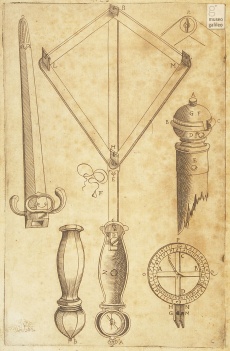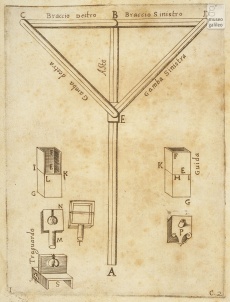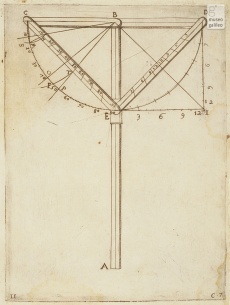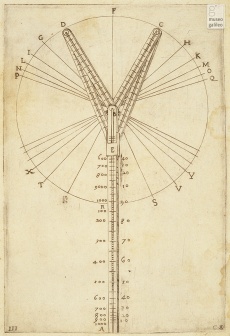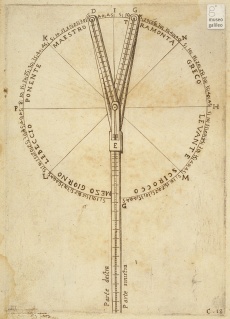Radio Latino
From Inventions
m (moved Radio latino to Radio Latino) |
|||
| Line 7: | Line 7: | ||
|data= 1583 | |data= 1583 | ||
| - | |descrizione= Instrument for architectural and topographic measurements. Invented and described by the condottiero Latino Orsini (1583), the ''radio latino'' (named after its inventor) is a universal instrument designed to carry out a wide range of functions. When sheathed in its case it looks like a dagger, but when opened it serves the same functions as the ancient ''radio greco'', the cross-staff (see) or ''balestriglia'', the Great Rule of Ptolemy, the [[quadrant]], the [[folding square]] and the [[gunner's quadrant]]. When fitted with a compass in the handle it was used mainly for surveying purposes. | + | |descrizione= Instrument for architectural and topographic measurements. Invented and described by the condottiero Latino Orsini (1583), the ''radio latino'' (named after its inventor) is a universal instrument designed to carry out a wide range of functions. When sheathed in its case it looks like a dagger, but when opened it serves the same functions as the ancient ''radio greco'', the cross-staff (see) or ''balestriglia'', the Great Rule of Ptolemy, the [[quadrant]], the [[folding square]] and the [[Gunner's Square |gunner's quadrant]]. When fitted with a compass in the handle it was used mainly for surveying purposes. |
|componenti= | |componenti= | ||
Revision as of 11:39, 27 July 2010
Name coined by the inventor associating his own name, Latino, with the now widespread term radio (see radius astronomicus).
Contents |
Inventor
Latino Orsini
Historic Period
1583
Description
Instrument for architectural and topographic measurements. Invented and described by the condottiero Latino Orsini (1583), the radio latino (named after its inventor) is a universal instrument designed to carry out a wide range of functions. When sheathed in its case it looks like a dagger, but when opened it serves the same functions as the ancient radio greco, the cross-staff (see) or balestriglia, the Great Rule of Ptolemy, the quadrant, the folding square and the gunner's quadrant. When fitted with a compass in the handle it was used mainly for surveying purposes.
Bibliographical Resources
Orsini, Latino. "Trattato del radio latino: istrumento giustissimo et facile più d'ogn'altro per prendere qual si voglia misura et positione di luogo tanto in cielo come in Terra, il quale oltre alle operationi proprie sue fa anco tutte quelle della gran regola di C. Tolomeo et dell'antico radio astronomico". In Roma, appresso Vincentio Accolti, 1583.
Existing Instruments
[Chicago, Adler Planetarium, inv. M-117.]
[Chicago, Adler Planetarium, inv. M-118.]
Florence, Museo Galileo. Institute and Museum of the History of Science inv. 619.
Florence, Museo Galileo. Institute and Museum of the History of Science inv. 3678.
Florence, Museo Galileo. Institute and Museum of the History of Science inv. 618.
Florence, Museo Galileo. Institute and Museum of the History of Science inv. 647.
Links (External)
http://masaccio:81/catalogue.museogalileo.it/indepth/RadioLatino.html
Images
Author of the entry: Filippo Camerota
